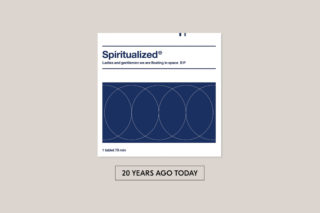How ‘Ladies And Gentlemen We Are Floating In Space’ silenced the inane cocaine jabber of Britpop
A slew of significant albums all came out in 1997 – Sam Walton is revisiting each one on its 20th anniversary

A slew of significant albums all came out in 1997 – Sam Walton is revisiting each one on its 20th anniversary
Typical: you wait ages for one era-defining masterpiece third album by a notoriously perfectionist band that incorporates nods towards experimental jazz, psychedelia and contemporary classical music in a firm rebuttal of Britpop and which is housed in coldly medicinal blue and white artwork full of aloof, impersonal slogans – and then two come along on the same day. However, where ‘OK Computer’, also 20 today, was as much a triumph of intellectual rigour and virtuoso musicianship as it was an expression of its authors’ collective angst, ‘Ladies And Gentlemen We Are Floating In Space’ is far more of a direct howl.
That’s not to negate the astonishing musicianship that runs all through ‘Ladies And Gentlemen’, or to downplay its beautifully meticulous, almost obsessive approach to production and mixing that famously took two years to complete, but simply to reinforce quite how visceral the album is and how broad is its spectrum of emotions, on top of all the technical and performance wizardry. Compared with its immediate peers – that handful of albums from 1997 that abandoned the status quo (and, in some cases, the Status Quo) of Britpop for something more pioneering – nothing is quite so up, or so down, as this.
Perhaps what’s most overpowering about the mental state of ‘Ladies And Gentlemen’, though, is less its extremity and more how complex and contradictory it is: the first entry of the horns and choir on ‘Come Together’ makes for a cacophony of addictive, fierce warmth, ‘I Think I’m In Love’ offers a sort of free-falling euphoria combined with an agoraphobic dread, and ‘The Individual’’s four minutes of atonal brass and bass drones – easily the most confrontational track on any major rock record in 1997 – is at once both terrifyingly intense and brimming with catharsis, evoking something akin to the disquieting calm that immediately follows a panic attack.
Combine those with the stately, stoically sad ‘Broken Heart’, the opioid lushness of ‘Cool Waves’, all fluttering flutes and declarations of love, and the mind-boggling 16-minute groove/chaos/groove of ‘Cop Shoot Cop’, and one of the finest accomplishments of the CD format emerges, a single 70-minute slab of uninterrupted sonic purging designed to be played in a single sitting (“take once, twice daily,” suggests the sleeve notes) and so lavish on virtually every metric that it feels almost otherworldly twenty years on: in current times of straitened budgets and diminishing concentration spans, the idea that an indie band with a modest following could create something both this expansive and expensive is rather alien.
While the seduction, wreckage and chaos wrought by heroin use and heartbreak is perhaps the album’s most immediate characteristic, though, soaring over all that emotional carnage clearer than any individual facet of the record is Jason Pierce’s singular sense of purpose, and that’s really what binds ‘Ladies And Gentlemen’, converting it from captivating potential car crash into master work. Pierce directs the album like an auteur filmmaker, constantly in control no matter how distressing the content, meaning that despite the 60-plus players at its peak, there’s never a sense that this is the work of more than one man. That monomaniacal vision is crucial to its success: Pierce’s devotion to every microscopic detail encourages trust, and the result is a feeling of being kept safe throughout the ride. Indeed, for all the cacophony that envelops the album’s second half, the military discipline of ‘No God Only Religion’ and the precision guitar squall of ‘Electricity’ both reinforce the feeling that nothing on the album will happen by accident.
‘Ladies And Gentlemen”s elephantine gestation makes it difficult to place in the story of 1997. After all, the songs were recorded in early 1995, before Britpop started turning sour, so it’s difficult to read the album as a direct reaction to that, despite its release date. (That said, given recent revelations about late-Britpop’s clandestine relationship with heroin, ‘Ladies And Gentlemen”s more brazen articulation of the drug’s myriad effects takes on added poignancy today.) Instead, both the album’s content and timing suggest that it’s acid house’s searing comedowns, all loved-up euphoria followed by crushing lows, rather than the inane cocaine jabber of Britpop, that offer the best context.
Of course, that presumes that ‘Ladies And Gentlemen’’s narcotic celebration is a response to anything at all. More realistically, a piece of work this monolithic tends to resist contextual association by its nature, and it would be no surprise if Pierce was thinking of nothing else during its construction. Certainly, listening to this monument, even after twenty years have dulled its initial surprises, still defies distraction.
Also out this week in 1997:
Radiohead – OK Computer (Parlophone). Chart peak #1
To read all the other entries in Sam’s Twenty Years Ago Today blog, click here.